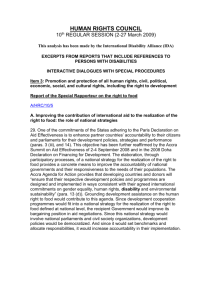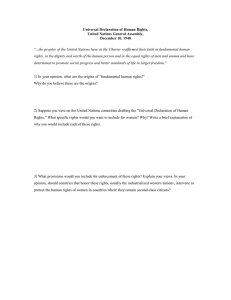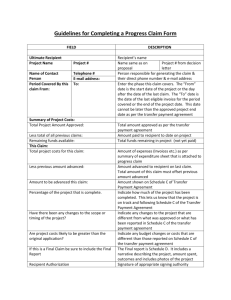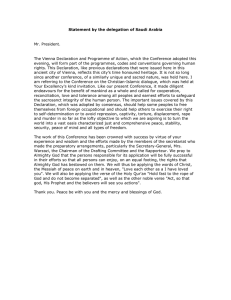The Right to Development-based approach ... Non-Aligned Movement
advertisement
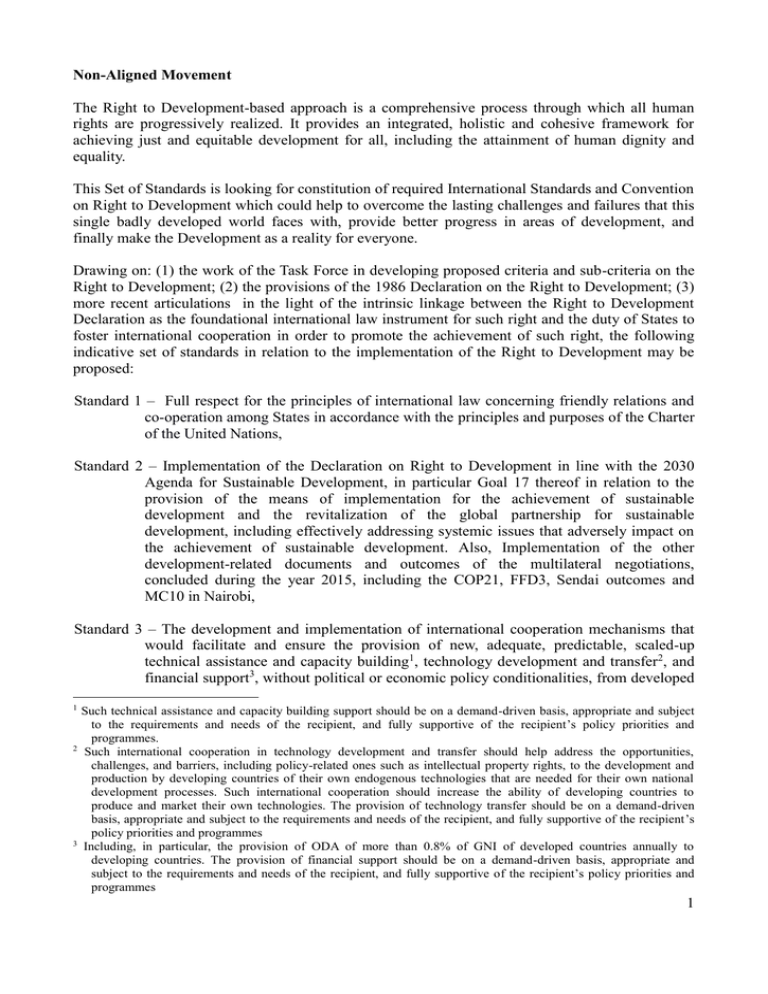
Non-Aligned Movement The Right to Development-based approach is a comprehensive process through which all human rights are progressively realized. It provides an integrated, holistic and cohesive framework for achieving just and equitable development for all, including the attainment of human dignity and equality. This Set of Standards is looking for constitution of required International Standards and Convention on Right to Development which could help to overcome the lasting challenges and failures that this single badly developed world faces with, provide better progress in areas of development, and finally make the Development as a reality for everyone. Drawing on: (1) the work of the Task Force in developing proposed criteria and sub-criteria on the Right to Development; (2) the provisions of the 1986 Declaration on the Right to Development; (3) more recent articulations in the light of the intrinsic linkage between the Right to Development Declaration as the foundational international law instrument for such right and the duty of States to foster international cooperation in order to promote the achievement of such right, the following indicative set of standards in relation to the implementation of the Right to Development may be proposed: Standard 1 – Full respect for the principles of international law concerning friendly relations and co-operation among States in accordance with the principles and purposes of the Charter of the United Nations, Standard 2 – Implementation of the Declaration on Right to Development in line with the 2030 Agenda for Sustainable Development, in particular Goal 17 thereof in relation to the provision of the means of implementation for the achievement of sustainable development and the revitalization of the global partnership for sustainable development, including effectively addressing systemic issues that adversely impact on the achievement of sustainable development. Also, Implementation of the other development-related documents and outcomes of the multilateral negotiations, concluded during the year 2015, including the COP21, FFD3, Sendai outcomes and MC10 in Nairobi, Standard 3 – The development and implementation of international cooperation mechanisms that would facilitate and ensure the provision of new, adequate, predictable, scaled-up technical assistance and capacity building1, technology development and transfer2, and financial support3, without political or economic policy conditionalities, from developed 1 2 3 Such technical assistance and capacity building support should be on a demand-driven basis, appropriate and subject to the requirements and needs of the recipient, and fully supportive of the recipient’s policy priorities and programmes. Such international cooperation in technology development and transfer should help address the opportunities, challenges, and barriers, including policy-related ones such as intellectual property rights, to the development and production by developing countries of their own endogenous technologies that are needed for their own national development processes. Such international cooperation should increase the ability of developing countries to produce and market their own technologies. The provision of technology transfer should be on a demand-driven basis, appropriate and subject to the requirements and needs of the recipient, and fully supportive of the recipient’s policy priorities and programmes Including, in particular, the provision of ODA of more than 0.8% of GNI of developed countries annually to developing countries. The provision of financial support should be on a demand-driven basis, appropriate and subject to the requirements and needs of the recipient, and fully supportive of the recipient’s policy priorities and programmes 1 countries to developing countries, in order to assist the latter to develop their national economies through nationally-appropriate and nationally-determined development pathways, Standard 4 – International cooperation in maintaining a stable national and global economic and financial systems in order to provide against volatility of national commodity prices, reducing risks of external macroimbalances, reducing and mitigating the impact of international financial and economic crises on developing countries, and protecting against volatility of international commodity prices, Standard 5 – International cooperation to ensure development and the elimination of sustained obstacles to development. States should realize their rights and fulfil their duties in such a manner as to promote a new international economic order based on sovereign equality, interdependence, mutual interest, respect and co-operation among all States, as well as to encourage the observance and realization of human rights, Standard 6 – States to cooperate in formulating international development policies with a view to facilitating the full realization of the right to development, and for international cooperation to promote the right to development through the provision to developing countries of the appropriate means and facilities to foster their comprehensive development, Standard 7 – States to cooperate in order to eliminate the massive and flagrant violations of the human rights of peoples and human beings affected by situations such as those resulting from apartheid, all forms of racism and racial discrimination, colonialism, poverty, natural disasters, foreign domination and occupation, aggression, foreign interference, terrorism and threats against national sovereignty, national unity and territorial integrity, threats of war and refusal to recognize the fundamental right of peoples to selfdetermination. In this regard, States shall foster their efforts for the implementation of clauses 158 and 159 of the Durban Declaration and Programme of Action, recognizing the need to develop programmes for the social and economic development of these societies within a framework of partnership based on solidarity and mutual respect and to allocate appropriate funding for implementation of such programmes, Standard 8 – States to stop adopting, maintaining or implementing unilateral coercive measures not in accordance with international law, international humanitarian law, the Charter of the United Nations and the norms and principles governing peaceful relations among States, in particular those of a coercive nature with extraterritorial effects, which create obstacles to trade relations among States, thus impeding the full realization of the rights set forth in the Universal Declaration of Human Rights and other international human rights instruments, in particular the right of individuals and peoples to development. A/HRC/30/L.2, Standard 9 - As the UN Charter calls on all Member States to respect the sovereignty, territorial integrity and political independence of other States, implementation of any development programme shall not prejudice in any manner the principle of non-intervention and noninterference in the internal and external affairs of the States. (Declaration on the Inadmissibility of Intervention and Interference in the Internal Affairs of States). 2
